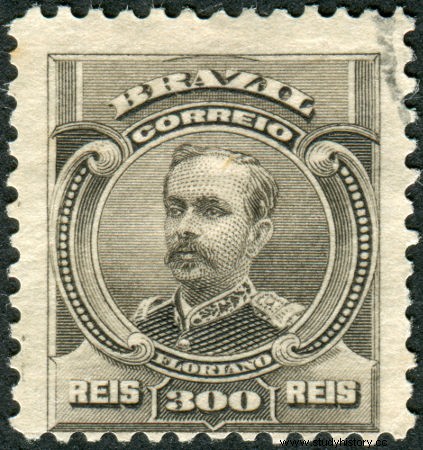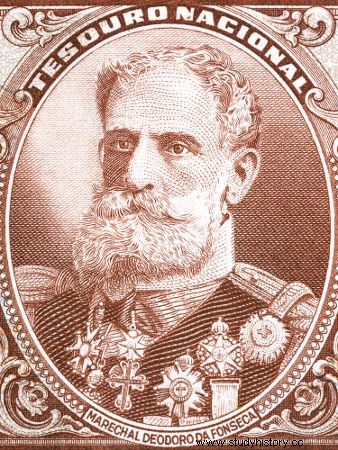
The Republic of the Sword it was the initial period of the First Brazilian Republic (1889 to 1930). This term is used to define the two military governments that Brazil had in this period. The two presidents of the República da Espada were Marshal Deodoro da Fonseca (1889-1891), in two distinct phases (provisional and constitutional), and Marshal Floriano Peixoto (1891-1894), who took over after Deodoro's resignation.
Background
The Republic of the Sword began after the Proclamation of the Republic, which took place on November 15, 1889. On that day, the Brazilian monarchic government suffered a coup and was replaced by the republican model. The Proclamation of the Republic was the result of the growing dissatisfaction of different political groups. The reasons that led to the end of the monarchy in Brazil are generally explained from three axes.
-
Question religious: symbolized the separation between State and Church after the arrest of two bishops (one from Belém and the other from Olinda) for civil disobedience after disrespecting the emperor's order;
-
Question military: it was a result of growing dissatisfaction in the army after the Paraguayan War. The army did not have its demands met by the emperor and, therefore, began to conspire against the monarchical order.
-
Question slave: symbolized the separation between slaveholders, especially from Vale do Paraíba, and the State. This departure was the result of the Lei Áurea, which harmed the interests of the slave-owning classes.
The combination of these factors, in addition to other issues that increased the degree of dissatisfaction with the monarchy, made the 1880s a period of permanent political crisis. The Brazilian monarchy could no longer meet the interests of different political actors, which led to a demand for an alternative government, in this case, the Republic .
The strengthening of republicanism in Brazil mobilized important names of the time, who, in November 1889, met with Marshal Deodoro da Fonseca so that he could lead a coup against the government. Deodoro da Fonseca was a monarchist, however, as he was dissatisfied with the government, he accepted to lead the coup. On November 15, 1889, the ministerial cabinet was deposed by the coup and, hours later, José from Sponsorship proclaimed the Republic.
The Republic of the Sword
Once the Republic was proclaimed, a Government was established Provisional. Deodoro da Fonseca was chosen to be the provisional president of Brazil. However, while he was in power provisionally, Deodoro showed signs of authoritarianism, which displeased some of the politicians, who soon acted to have a new Constitution drafted.
A Constituent Assembly appointed five people to write the new Brazilian Constitution. The new Constitution was revised by Rui Barbosa and, after consideration by the Constituent Assembly, it was approved and promulgated on February 24, 1891. The Constitution from 1891 brought important changes to Brazil:
-
Federalism :this system allowed a greater degree of autonomy for the (now named) states;
-
Suffrage universal male :Men over 21 who were literate and who were not beggars or private soldiers had the right to vote. Women could not vote;
-
Presidentialism :the position of president was established as the highest representative of the Executive in Brazil. The president would be elected by direct vote for a term of four years.

Marshal Deodoro da Fonseca was President of Brazil from 1889 to 1891
After the promulgation of the new Constitution, indirect elections were held, which elected Deodoro da Fonseca as president of Brazil, now for his constitutional term. However, during this term, Deodoro followed his authoritarian line and took positions that led to political confrontation against the Brazilian Congress.
On November 3, 1891, Deodoro decreed the closing of the Congress and called for new elections to form a new Congress. In addition, he informed that changes would be made to the Constitution to ensure the strengthening of the Executive branch to the detriment of the other branches (Legislative and Judiciary).
Deodoro's measures generated a strong reaction, especially from politicians who supported Floriano Peixoto and members of the Navy. The Brazilian president was forced to resign on November 23 of the same year. Deodoro's successor in the presidency was his deputy, Marshal Floriano Peixoto.
During Floriano Peixoto's government, the main highlights were the revolts that started in different parts of Brazil and that demanded direct government intervention. The government’s repression against these movements earned Floriano the nickname “iron marshal ”. The two movements were the Federalist Revolution and the Armada Revolt.
The Revolution Federalist (1893-1895) was the result of a dispute between political groups in Rio Grande do Sul. A group defending parliamentarism started a struggle against the local federalists. The Brazilian government sided with the Federalists in this conflict that resulted in 10,000 deaths. Subsequently, the clashes extended to Santa Catarina and Paraná. The government-backed group emerged victorious.
The Revolt da Army (1893-1894), in turn, was a rebellion on the part of the Navy, which invaded vessels, aimed them at Rio de Janeiro and bombed the city. This rebellion is seen by historians as a reaction by the monarchists against the government of Floriano Peixoto (the Navy was a stronghold that had a large number of monarchists).
Subsequently, those involved in the Armada Revolt moved to the region of Santa Catarina and allied themselves with liberal defenders of parliamentarism who fought against the Federalists in the Federalist Revolution. The movement, however, failed and definitively weakened monarchism in Brazil.
Scissors
In addition to the political crisis, the Republic of the Sword was also marked by a severe economic crisis. This economic crisis was the result of the policy that Rui Beard implemented in the Brazilian economy. Rui Barbosa, Minister of Finance, allowed private banks to issue paper money and facilitated access to credit as ways to boost the economy.
The results were disastrous, and the Brazilian economy faced currency devaluation, increased financial speculation and rising inflation. The effects of the Encilhamento were only contained around 1897, during the government of Prudente de Morais. The crisis in the Brazilian economy was part of the context of the global crisis of capitalism, which had lasted since 1873.
*Image Credits:Sergey Kohl and Shutterstock
Take the opportunity to check out our video lessons related to the subject:
